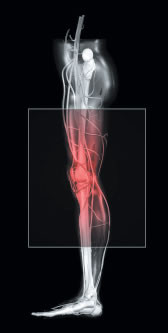
Daily cup of coffee may prevent afib recurrence

Gene-editing therapy lowers harmful blood fats in early study

What is EMDR therapy, and who can it help?

GLP-1 drugs versus bariatric surgery for treating obesity

Trying to lose weight? Be careful not to lose muscle

Two dumbbells, three exercises, and 10 minutes

Easing the emotional burden of IBS

Modify your push-ups to meet your fitness level

What is long QT syndrome?

Stroke survivors may benefit from very low LDL levels
Pain Archive
Articles
Ask the doctor: I fractured my hip three years ago, but my leg still hurts when I exercise. Should I stop exercising?
Image: Thinkstock |
Q. I'm a 78-year-old athlete and dancer. Three years ago, I broke my hip. After it was repaired I completed extensive physical therapy. Since then, I've been working out at a gym using the treadmill, stationary bicycle, and rowing machine. But I still have tremendous pain in my thigh. Should I stop exercising? It helps me control my weight and blood pressure.
A. I applaud you for persisting with your exercise. You're not only keeping your weight and blood pressure down but you're also building stronger bones to help prevent fractures in the future.
6 ways to use your mind to control pain
Meditation with guided imagery, which often involves imagining yourself in a restful environment, may reduce your need for pain medication. |
Relaxation, meditation, positive thinking, and other mind-body techniques can help reduce your need for pain medication.
Drugs are very good at getting rid of pain, but they often have unpleasant, and even serious, side effects when used for a long time. If you have backache, fibromyalgia, arthritis, or other chronic pain that interferes with your daily life, you may be looking for a way to relieve discomfort that doesn't involve drugs. Some age-old techniques—including meditation and yoga—as well as newer variations may help reduce your need for pain medication.
Ask the doctor: What does a low ankle-brachial index mean?
Q. Because I'm a former smoker and was having leg pains, my doctor recommended that I have an ankle-brachial index test. He said my score was on the low side. What does that mean?
A. The ankle-brachial index is a test that measures blood pressure at the brachial artery (in the arm, close to the heart) and the ankle (far from the heart). Normally, blood pressure in the legs is the same or a little higher than in the arm, so the ratio between the arm and ankle is 1.0 or higher. A lower ratio (less than 0.95) means blood is not moving well in the lower half of your body. You may have peripheral artery disease (PAD), which is usually caused by a buildup of fatty deposits in arteries in the legs that limits blood flow to the muscles. People with significant leg pain and cramping during exercise—the most common symptoms of PAD—usually have an ankle-brachial ratio of 0.8 or less.
Osteoarthritis relief without more pills
It's possible to ease arthritis pain and stiffness without medication, but it takes some work. |
Here are some steps you can take to reduce your reliance on medication to control symptoms and stay functional.
What triggers back pain?
There's been a lot of research on what puts men at greater risk of back problems, like being overweight or sedentary. But we know less about what exactly triggers a bout of back pain. A new study in Arthritis Care and Research helps fill that gap.
The study involved 1,000 people who went to 300 different clinics in Australia with low back pain. The researchers carefully interviewed the participants to figure out when the back pain started and possible triggers they noticed within two hours of when the pain started.
Opioid painkillers: Take the strong stuff only when you need it
It should be matched to the right pain condition and used for a limited time—then switch to safer options.
Over-the-counter pain relievers are great for ordinary aches and pains, but for severe, unrelenting pain that interferes with daily life, you may need something stronger. In such cases, men may end up taking medications called opioids, which block pain perception in the brain. The best-known opioid drugs are oxycodone (OxyContin, Percocet) and hydrocodone (Vicodin).
Acetaminophen: Minimal relief for knee arthritis pain
The pain from an arthritic knee can be intense, limiting daily activities and independence. Men can try a range of medications, but overall acetaminophen (Tylenol, other brands) appears to relieve pain only slightly better than a placebo pill, according to a research review in Annals of Internal Medicine.
The researchers pooled results from 137 randomized clinical trials involving about 33,000 people with knee arthritis and compared the relative effectiveness of the following treatments:
Could that leg pain be peripheral artery disease?
The pain of peripheral artery disease may be felt above or below the knee during activity, and will fade with rest. Image: Thinkstock |
The telltale sign is leg pain and fatigue that comes on with activity and goes away with rest.
When are opioids safe to take?
Opioids are commonly used to control acute, intense pain. Meditation, yoga, and acupuncture may help control pain when tapering off opioids. |
Although these powerful pain relievers can be addictive, opioids are safe for most people when used properly.
Keep moving when knee or hip pain strikes
Mobility relies on the body's two largest joints, the hips and knees. We ask a lot of both these joints: they must bear our full weight and coordinate movement over a lifetime of standing, walking, running, dancing, and sports. Not surprisingly, hip and knee pain are common complaints, and nearly everyone who lives into old age can expect some trouble with these joints. But taking care of your hips and knees and managing any pain that arises will help you avoid losing mobility as you age.
Try these self-help measures when knee or hip pain strikes:

Daily cup of coffee may prevent afib recurrence

Gene-editing therapy lowers harmful blood fats in early study

What is EMDR therapy, and who can it help?

GLP-1 drugs versus bariatric surgery for treating obesity

Trying to lose weight? Be careful not to lose muscle

Two dumbbells, three exercises, and 10 minutes

Easing the emotional burden of IBS

Modify your push-ups to meet your fitness level

What is long QT syndrome?

Stroke survivors may benefit from very low LDL levels
Free Healthbeat Signup
Get the latest in health news delivered to your inbox!
Sign Up










